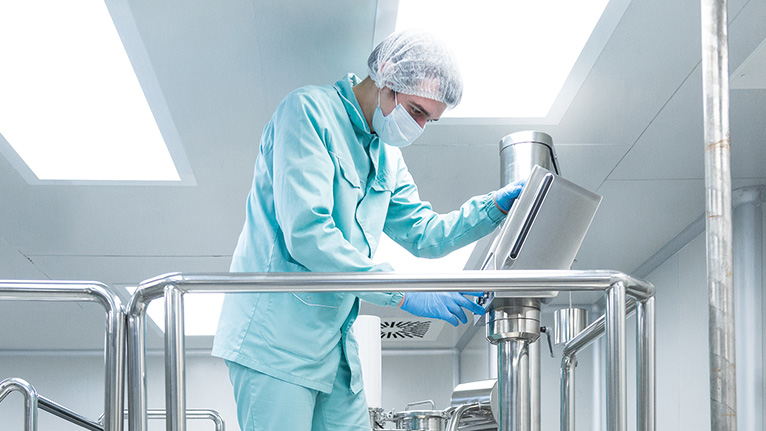April 6, 2023 | Reading time: approx. 6 minutes | First published by Process under this link.
The interview was conducted by Christin Senftleben.
The chemical and pharmaceutical company Merck was the first company to implement a modular automation concept in the laboratory environment based on Module Type Package - MTP. In doing so, the company opened up an area that, at first glance, is not the focus of MTP technology. Why Dr. Sebastian Härtner from Process Development and Principal Project Lead in Electronics, Integrated Supply Chain sees 2022 as a decisive year for the breakthrough of MTP.

Merck is a very active supporter of MTP. Over the past few years, you have steadily driven the exchange forward. Why?
Sebastian Härtner: The market requires us to be faster and more flexible. We all feel this in the industry. At Merck, we are open to the topic of MTP and want to discuss it with others. We want to drive this topic forward jointly, because we see that it is not the existing hardware alone that is decisive for success, but the know-how surrounding the process that is run on such systems. Accordingly, it is possible to conduct an intensive and very specific exchange about hardware in order to make the technology available more quickly through standardization. We are currently conducting this exchange with a wide range of companies in Germany and Europe.
You talk about 2022 being the breakthrough year for MTP. What has changed?
Härtner: We saw at Achema and SPS 2022 at the latest that companies are now offering products that enable precisely this technology and thus make it usable for us. In other words, we have management systems on the market that we can buy commercially. The MTP standard itself is not yet finalized. But with the standardizations that are now there from sheet 1 to sheet 4, we can actually work. That's why 2022 was a critical year. We will still learn many things in the MTP community, but the breakthrough is there.
"However, MTP only works if we question and - if necessary - abandon internal processes. Technology and mindset are a total package. Everyone in the environment has to be hooked and understand why and how we're implementing it."
Dr. Sebastian Härtner, Merck
Which economic benefits does MTP bring to your company?
Härtner: For Merck, the benefit is rapid scale-up. With the system we have developed, we will also produce. That is a speed that we need.
We have a huge opportunity here because the system stays the same. It just gets pushed from the lab environment to production. As a result, there is no impact on product quality. The roll-out of manufacturing processes in modular plants is the most significant leverage at the beginning. In the future, energy efficiency and sustainable plant utilization enabled by MTP will be a big issue for us.
As already mentioned, MTP allows processes and applications to be seamlessly transferred from R&D to production. How does this innovative concept influence collaboration between divisions?
Härtner: MTP gives us more flexibility in describing and designing processes in a meaningful way. However, MTP only works if we question internal processes and - if necessary - also abandon them. Technology and mindset are a complete package. Everyone in the environment needs to be hooked and understand why and how we are implementing it.
In contrast to the traditional process, the process engineering department has to work with automation much earlier. Building such systems and modules requires a common definition of what exactly the module must be able to do in the end. Since MTP is the driver of the modules, that now has to be defined earlier. This is a completely different way of proceeding.
So MTP requires a new form of work organization?
Härtner: Yes. The main issue is that we need experts, especially at the automation level. We need some kind of intermediary who can translate the old world into the new. Pure programming is one thing. It is even more difficult to describe how the driver should work and to transfer that in turn from process engineering to automation engineering and to set up the system. The experts for this are rare at the moment. However, because we got involved with the topic of MTP at an early stage, we were able to build up experts in this field internally.
One of our most effective leverages when it comes to MTP is the close cooperation between process engineers, laboratory, workshop and automation experts, who all work together in one department at our company. Because of this proximity, communication barriers are also extremely low. Because we don't have to cross divisional boundaries and describe to each other in writing what we want to do. There is actually bilateral joint development here. It's a different world, and I believe this has led to our being very successful in this area.
Stay up to date – subscribe to our newsletter new
We regularly deliver news about our products and solutions directly to your inbox.
Merck has reached a first major milestone with the introduction of an automation concept in the laboratory environment. When will the first MTP-based modules be used in production at Merck?
Härtner: We have already built and are operating over 100 modules for the laboratory environment. Based on our experience, we are now extrapolating the requirements for the production modules and have to meet additional requirements from the German Federal Immission Control Act. We expect to implement all of this in production in Darmstadt by the end of 2023, once we have received approval from the regional council.
What will be the global impact of MTP?
Härtner: Through the Biophorum organization, work is being done for the biopharmaceutical industry on the use of the MTP standard in order to use one standard across companies so that the challenges of the future (time-to-market, efficiency) can be met more easily.The use of the standard (VDI-2658) outside the chemical process industry, for example in shipbuilding, will make its additional contribution to this new automation technology being used worldwide.
Read more
Process industry of the future? With MTP!

We explain how MTP enables more flexibility and shorter time-to-market in the process industry.
